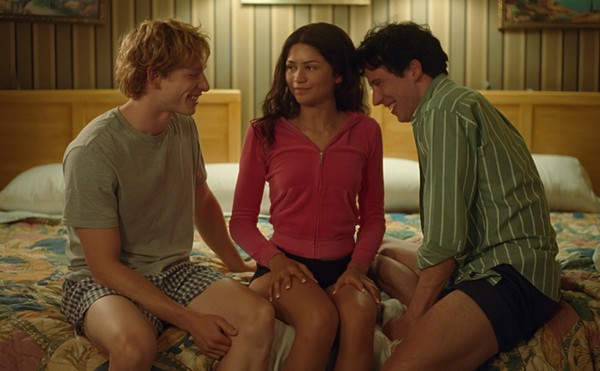In his brief remarks before the first public screening of the 2013 Sundance Film Festival, Robert Redford praised the Sundance Institute's ongoing filmmaker development labs as "our core," noting that the festival itself was conceived "to create an audience for the filmmakers in our lab program."
That program has now birthed a series of satellite Sundance labs all over the world, including the one in Jordan that was responsible for developing actress-writer-director Cherien Dabis' May in the Summer, a buoyant comic drama about three Palestinian-American sisters navigating currents of love, loss, and dysfunctional parent-child relationships in present-day Amann. May, one of four opening-night selections to screen in Park City Thursday night, is Dabis' second feature, following 2009's Amreeka, also a Sundance lab project.
Where Amreeka looked at a Palestinian Christian family emigrating from Ramallah to suburban Illinois, May charts an opposite journey, with American-born May (played by Dabis herself) traveling from New York to Amann to prepare for her impending nuptials. She's a published author who's just written a book about Arabic proverbs; her fiancé, Ziad, is an Islamic studies professor who, much to the chagrin of May's devoutly Christian mother (the great Palestinian actress Hiam Abbass), happens to be Muslim. That's just the start of the familial complications: Mom is divorced from May's American diplomat father (Bill Pullman), who has recently gotten remarried to a younger Indian woman (Ritu Singh Pande). Sister Yasmine (Nadine Malouf) is a party girl newly laid off from her job, while sister Dahlia (Arrested Development's hilarious Alia Shawkat) is a lesbian tentatively trying to step out of the closet. And then there's Ziad (Syriana's Alexander Siddig), who's conspicuous by his absence on May's arm.
That may risk making May in the Summer sound like an overstuffed sit-com, and there are moments when it feels like one, but as in her previous film Dabis is smart enough to balance broadly accessible comedy with sharply drawn, three-dimensional characters and a personal, reflective sensibility. Dabis, who is Palestinian herself, grew up in Omaha, and there's a poignancy to the way her characters grapple with their amorphous cultural identities -- not quite at home in the U.S. or in Jordan, where Palestine looms just across the Black Sea. You could swim there, one character notes, were the water not teeming with land mines. And that's about as directly as Dabis engages with the ever-present "conflict" between Israel and its Arab neighbors, preferring instead to focus on the ways ordinary people go about their everyday lives -- shopping, partying, looking for happiness -- no mater the war planes that periodically streak loudly across the sky.
Meanwhile, the first full day of Sundance 2013 might have been subtitled "Sex sells, but who's buying?" (A question sure to be answered over the next few days as buyers begin whipping out their checkbooks.) From mid-afternoon until late evening, the screen of the Eccles Theatre (Sundance's largest screening venue) lit up with one high-profile premiere after another that featured well-known stars in a series of explicit compromising positions.
First up was director John Krokidas' Kill Your Darlings, about the ill-fated love triangle between the young Allen Ginsberg, his libertine fellow Columbia student Lucian Carr, and the obsessive David Kammerer, whom Carr stabbed in Riverside Park, bound, and dumped into the Hudson River on an August night in 1944. Ginsberg is well played -- to the evident surprise of some critics -- by erstwhile Harry Potter star Daniel Radcliffe, sporting the requisite "Jew fro" (a point of discussion at the post-screening Q&A) and the hesitant but hungry demeanor of a brilliant poet about to bloom. But it's the always inventive Ben Foster, lurking on the edges of the movie as the young William Burroughs, who handily steals the show. One of two Beat-era nostalgia trips premiering at Sundance (the second, Michael Polish's Jack Kerouac-centric Big Sur, screens later in the week), is an unquestionable improvement over last year's paint-by-numbers On the Road, but it still falls victim to the kind of idol worship that has made most movies about the Beats hard to take, and to ham-fisted dialogue like "It's our turn. Let's show them what we can do!" (Did people ever talk like that, even in the '40s?) Suffice it to say that the climactic montage juxtaposing Kammerer's slaying with Ginsberg's full-on homosexual deflowering doesn't exactly best The Godfather's influential-to-a-fault baptism/massacre.
From the Beats to beating off: next up was Joseph Gordon-Levitt's hugely enjoyable directorial debut, Don Jon's Addiction, in which the former child star turned solid character actor casts himself as a muscle-bound, spray-tanned Jersey guido with a debilitating addiction to online porn. Sporting a slicked-back pompadour and a marked aversion to sleeves, Gordon-Levitt's Jon is an intentionally outsized comic creation, and the actor gives himself over to it fully, taking obvious glee in imploding his thoughtful, somewhat bookish screen image. And Gordon-Levitt the director gives the film an addict's cyclical rhythms, making amusing leitmotifs out of the startup chime from Jon's computer, the clack of his fingers on the keyboard, and the swoosh of his wadded-up kleenex hitting the wastebasket. Breaking this vicious cycle is a radiant Scarlett Johansson as the sultry seductress who forces Jon to confront his addiction, and Julianne Moore as the earthy, pothead cougar who shows him how to actually overcome it. For at the heart of the often outré Don Jon's Addiction is a nugget of seriousness about the search for true intimacy in a world of so much instant gratification. Rounding out the game-faced cast: a sublime Tony Danza as Jon Sr., an even more uncanny JG-L doppelganger than Bruce Willis in last year's Looper.
Finally there was Coco Before Chanel director Anne Fontaine's Two Mothers, an English-language French-Australian co-production set along the idyllic coastline of Seal Rocks, New South Wales -- a town so small that there is, evidently, nothing better for two handsome teenage surfers (played by Animal Kingdomdiscovery James Frecheville and Twilight's Xavier Samuel) than to sit around playing cards, getting drunk and eventually climbing into the sack with each other's middle-aged mom. Naomi Watts and Robin Wright are the two sun-kissed MILFs of the title, and they play the parts with such conviction -- as do their young co-stars -- that, at the late hour it screened, there was something guiltily pleasurable about Two Mothers and its high-toned Skinemax vibe. Fontaine is too straight-arrow a director to push the material fully over the absurd precipice -- the way that, say, Paul Verhoeven readily would have -- but that didn't stop the Eccles audience from erupting in waves of laughter during some of the more risible sections. When asked, during the post-screening Q&A, what surprised her most about the audience's response, a befuddled Fontaine answered in broken English, "Ze laughing. I'm not sure what that means." If a ballsy distributor picks this up and markets it as a full-on camp melodrama-- Mommies Dearest -- they might just have a hit on their hands.
And Sundance 2013 is just be heating up. Still in the wings: James Franco and co-director Travis Mathews' Interior. Leather Bar., which purports to "reimagine" the 40 minutes of hardcore S&M material rumored to have been excised from William Friedkin's 1980 gay serial-killer drama, Cruising. Park City locals, lock up your children.
Follow Scott Foundas on Twitter at @FoundasOnFilm and read more of his stories here: Foundas on Film.






